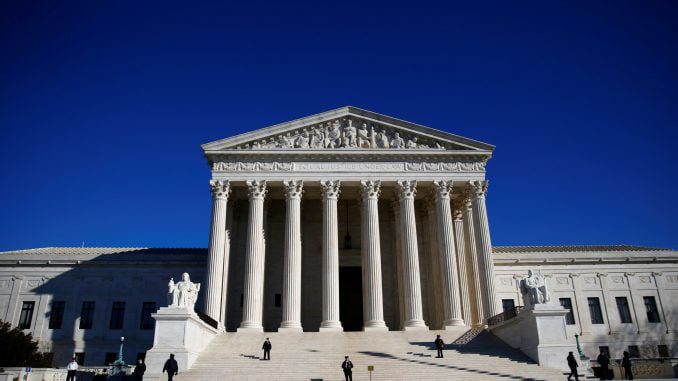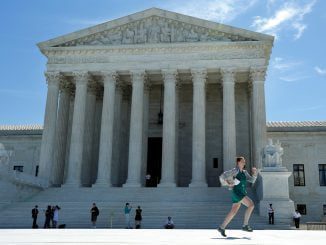
WASHINGTON, D.C. — The U.S. Supreme Court on Tuesday appeared hesitant to let states force out-of-state online retailers to collect sales taxes on purchases, with some of the justices saying Congress would be best suited to resolve the matter.
The nine justices heard a one-hour argument in the closely watched case pitting South Dakota, backed by President Donald Trump’s administration, against e-commerce businesses, a fight potentially worth billions of dollars that could affect states’ coffers and consumers’ wallets.
According to Andy Ellen, president of the North Carolina Retail Merchants Association, it’s time to close the tax loophole that gives a financial advantage to online-only retailers over brick-and-mortar stores.
“This is the most important case affecting the retail industry in a quarter of a century,” said Ellen. “When that rule was made, internet retail was relatively new. … Hopefully the Supreme Court will modernize the rule, thereby leveling the playfield.”
North Carolina and states across the nation are watching the case closely as South Dakota appeals a lower court decision that favored Wayfair, Overstock.com and Newegg. A ruling favoring South Dakota could help small brick-and-mortar retailers compete with online rivals while funneling up to $18 billion into the coffers of the affected states, according to a 2017 federal report.
“The sales tax that brick-and-mortar retailers pay go to roads, infrastructure, they employ people in the community — with online retailers, their trucks use the roads, their boxes go in the landfill that we all pay for,” said Ellen. “We aren’t afraid to compete, but they shouldn’t have, in this state, 7.25 percent advantage over those businesses doing good things in their communities.”
Some of the justices appeared to agree with the companies that a ruling striking down that precedent in a case called Quill Corp v. North Dakota would lead to a scramble among states to pass their own laws that could impose varying burdens on small businesses.
“Congress is capable of crafting compromises and trying to figure out how to balance the wide range of interests involved here,” Justice Elena Kagan said.
Along similar lines, Justice Sonia Sotomayor said the questions raised in the case are “wrought with difficulties.”
It remained unclear how the court will rule. Some members of the court, including the often-pivotal Justice Anthony Kennedy and Trump’s appointee Neil Gorsuch, appeared sympathetic to South Dakota.
“Why should this court favor a particular business model?” Gorsuch asked, in reference to e-commerce companies that do not collect taxes.
Kennedy said the 1992 decision has been “proven incorrect” and indicated it is the court’s responsibility to overturn it rather than waiting for Congress to act. Justice Ruth Bader Ginsburg made a similar point, saying that it was not Congress’ job “to overturn our obsolete precedent.”
But Chief Justice John Roberts cited court filings saying the problem South Dakota is seeking to resolve may be lessening because many of the biggest online retailers, like Amazon, now collect state sales taxes.
“And if it is, in fact, a problem that is diminishing rather than expanding, why doesn’t that suggest that there (is) greater significance to the arguments that we should leave Quill in place?” Roberts asked.
Amazon, which is not involved in the Supreme Court case, collects sales taxes on direct purchases on its site but does not collect taxes for items sold on its platform by third-party venders, constituting around half of total sales.
South Dakota depends more than most states on sales taxes because it is one of nine that do not have a state income tax. South Dakota projects its revenue losses because of online sales that do not collect state taxes at around $50 million annually, while its opponents in the case estimate it as less than half that figure.
The National Retail Federation, which supports South Dakota, has a membership list that includes Walmart and Target, as well as Amazon. They say that state and local governments stand to lose about $260 billion by 2025 if the rule doesn’t change.
“Things have changed a lot since 1992. The entire nature of interstate commerce has changed,” said Stephanie Martz, the federation’s general counsel.
E-commerce companies supporting Wayfair, Overstock and Newegg include two that provide online platforms for individuals to sell online: eBay and Etsy.
“Win or lose at the Supreme Court, we will continue to advocate for a legislative solution and a level playing field where all retailers collect and remit sales tax on the same basis,” Wayfair spokeswoman Jane Carpenter said in a statement.
Brian Bieron, eBay’s senior director of government relations, said in an interview the 1992 precedent “provides the many small businesses that use the internet with a very clear and simple and stable legal environment in which to grow their business.”
Justice Samuel Alito said a ruling favoring South Dakota could embolden states “tottering on the edge of insolvency” to seek to collect as much sales tax as possible by targeting out-of-state businesses.
The case comes from a 2016 South Dakota law requires out-of-state online retailers to collect sales tax if they clear $100,000 in sales or 200 separate transactions. State legislators knew the measure was unlawful under the 1992 precedent. The state sued a group of online retailers after the law was enacted to force them to collect the state sale taxes, with the aim of overturning the precedent.
Reuters News Service contributed to this report.



